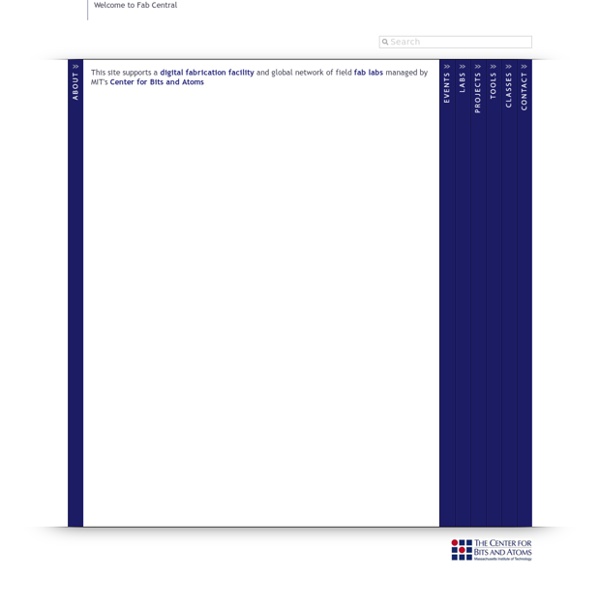



Is Revitalizing A Neighborhood What’s most striking when you enter the brick bunker formerly known as Stock House No. 3 is the green, says Fred Haberman, a cofounder and partner in Urban Organics, a futuristic farm housed inside a long-vacant structure on the former site of Hamm’s Brewery in East St. Paul. "It’s mind-boggling to come into this old building and see so much greenery," he says. "The colors are almost electric. Looking at this kale planted two weeks ago, you’d be shocked at how quickly it’s grown." The "secret sauce" for growing that electric-green kale, chard, and leafy herbs is the nutrient-rich wastewater pumped from four 3,500-gallons tanks of tilapia, which flows through a system of pipes and filters to irrigate and fertilize the plants before returning, clean, to the fish.
FabLab A fab lab (fabrication laboratory) is a small-scale workshop offering (personal) digital fabrication.[1][2] A fab lab is generally equipped with an array of flexible computer controlled tools that cover several different length scales and various materials, with the aim to make "almost anything".[3] This includes technology-enabled products generally perceived as limited to mass production. While fab labs have yet to compete with mass production and its associated economies of scale in fabricating widely distributed products, they have already shown the potential to empower individuals to create smart devices for themselves. These devices can be tailored to local or personal needs in ways that are not practical or economical using mass production.
Living lab A living lab is a research concept. A living lab is a user-centred, open-innovation ecosystem,[1][2] often operating in a territorial context (e.g. city, agglomeration, region), integrating concurrent research and innovation processes[3] within a public-private-people partnership.[4] The concept is based on a systematic user co-creation approach integrating research and innovation processes. These are integrated through the co-creation, exploration, experimentation and evaluation of innovative ideas, scenarios, concepts and related technological artefacts in real life use cases.
Urban Organics-Haberman Transforming the food system and strengthening local communities. Haberman believes in the pioneering spirit so much that sometimes we just have to take the plunge ourselves. At a new organic urban farm in St. Paul, we’re quite literally diving in because this farm doesn’t use dirt. It’s all about water. Aquaponics, to be exact. The Fab Charter What is a fab lab? Fab labs are a global network of local labs, enabling invention by providing access to tools for digital fabrication What's in a fab lab? Fab labs share an evolving inventory of core capabilities to make (almost) anything, allowing people and projects to be shared What does the fab lab network provide?
Report Vol. 3 - 2014 - Circular Economy Reports Report Vol. 3 - 2014 About the Report Business leaders and governments alike acknowledge that continued wealth generation requires a new industrial model that is less dependent on primary energy and materials inputs. In its previous reports, the Ellen MacArthur Foundation has focused on the economic and business benefits of such a circular model of development. A collaboration between the World Economic Forum, the Ellen MacArthur Foundation and McKinsey & Company, this new report aims to reconcile the goal of scaling a circular model with the reality of a global economy and complex multi-tier supply chains. The key objective is to propose a very specific joint plan of action for industry leaders.
FabLab@School FabLab@School is a growing network of educational digital fabrication labs that put cutting-edge technology for design and construction -- such as 3D printers and laser cutters -- into the hands of middle and high school students. TLTL researchers have spent the last years developing low-cost tools, a curriculum, and a rigorous teacher-preparation program. The labs are the proving ground for much of the research going on in TLTL. British public to choose ‘greatest issue of our time’ for £10 million prize Longitude Prize 2014, a challenge with a prize fund of £10 million, has been launched today to help solve one the greatest issues of our time. The British public will cast the deciding vote to choose the issue that the prize will tackle. The prize has been developed and run by Nesta, the UK’s innovation foundation. It was launched by the Prime Minister at G8 last year, and through the Department for Business, Innovation and Skills is being supported by the Technology Strategy Board, the UK’s innovation agency, as launch funding partner. Longitude Prize 2014 commemorates the 300th anniversary of the Longitude Act where in 1714 the British government threw down the gauntlet to solve one of the great scientific challenges of that century: how to pinpoint a ship’s location at sea by knowing its longitude.
From a Facebook group to an organization - the OuiShare Manifesto It all started in 2010, when Antonin Léonard was blogging about collaborative consumption in French. Little did he know that this was the beginning of the organization we now call OuiShare – a network of people with common values, which have finally been summarized in a manifesto. In its early stages, the OuiShare community was a Facebook group created by Antonin in April 2011 to connect people who believed in the potential of the collaborative economy and were trying to make it a reality. Shortly afterwards, they began to organize meetups every month in Paris at Next&Coworking or at Nathan Stern’s place to continue their discussions about the collaborative economy in person. It was then that Antonin felt he was on to something bigger: My intuition was that a new culture was emerging, a culture of openness, transparency, empathy and that this culture would be the foundation of what would become OuiShare.